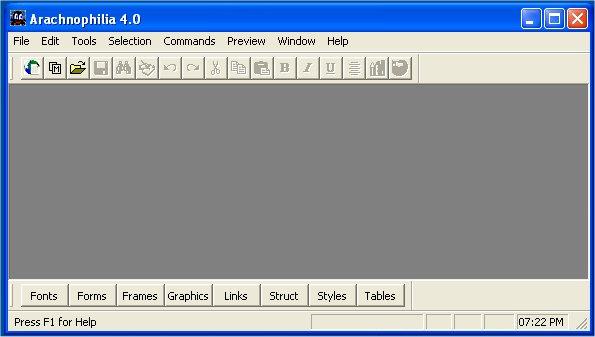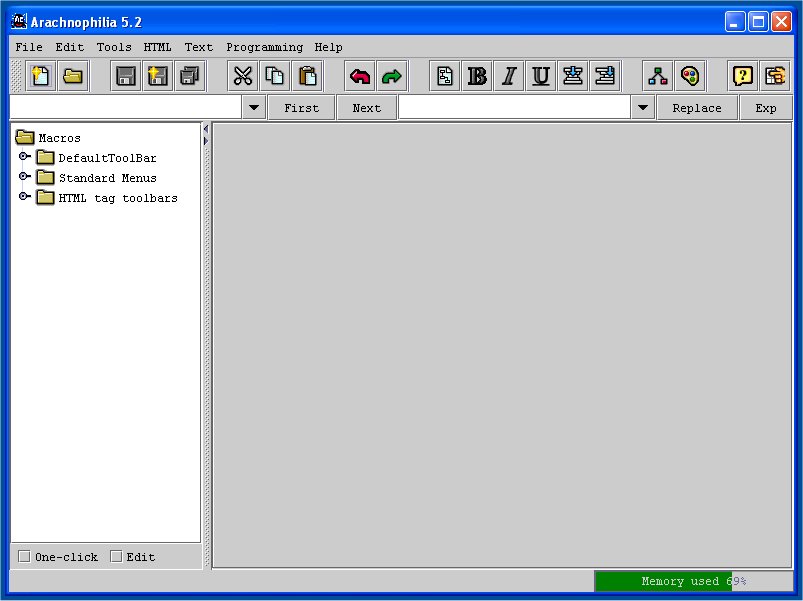Freeware from the Net -- Arachnophilia
Collated by Paul Quek (e-mail: quekpaul@hotmail.com), in Singapore
Arachnophilia is a web page editor written by Paul Lutus, and is distributed under what he calls the CareWare concept -- which is a great concept.
I am still using an old version -- Version 4 -- of Arachnophilia, as it is really all that I need for creating the text in web pages. See the screenshot below:

Still, every now and then I would log onto Paul Lutus's Arachnophilia website and get the latest version of Arachnophilia installed just for kicks and to check out what's new!
For example, the following is the screenshot for Version 5.2 of Arachnophilia, which is written in Java and thus can run on any platform that has a Java virtual machine:

There are also great (and fun - don't forget the Internet is for fun!) writings from Paul, in his Arachnophilia website, especially what Paul says about what the Internet has become: the Net had been hijacked by the stupid and greedy corporate world and is now just "one interminable advertisement" where the vendors are "perpetually in your face".
Arachnophilia is Freeware as well as CareWare -- and Freeware means exactly what it says: you DO NOT have to pay in money -- EVER!!! Freeware, as Lutus reminds us, is not shareware, nagware, crippleware, adware, and the sleazy spyware!
I like the following from Lutus:
To put it simply, freeware must meet some of your needs or it cannot exist. By contrast, commercial software can fail this basic standard and continue to exist, even thrive, for decades. Example: Windows, which does precisely what it wants on your computer, usually at your expense.
... Windows isn't supposed to make sense, it's supposed to make money. ...
To cut to the chase, my programs are freeware. Actually, they are CareWare, but the basic premise of CareWare (people should stop whining) is so idealistic and out-of-date now that I will eventually have to remove all references to CareWare from my programs. Telling modern Internet users to stop whining is like telling them to stop breathing — it seems unrealistic and inhumane.
When you download a freeware program, you have some rights, some responsibilities, and you have just one remedy:
What I am saying in essence is that users must not treat freeware like commercial software. For one thing, much of freeware is better than commercial software. Why? Because most people who write freeware actually like computers and programming, and most freeware programs were written by people who, whatever they were doing, were not watching a clock while feeling exploited by a corporation.
- Rights
- That you will not have to pay for the program, in any way, ever.
- That the program will turn out to be what its description says it is.
- That the program will meet at least some of your needs.
- That your privacy will not be invaded.
- Responsibilies
- You must read the documentation and FAQ list before asking a question.
- You may not demand new answers to questions already covered in the FAQ list or the documentation.
- You may not demand customer service or one-on-one instruction.
- You don't have the right to demand program changes to suit your personal tastes.
- If you feel an impulse to say "You only get what you pay for," be sure your sexual partner doesn't overhear you, because, unless brain-damaged, he or she will stop sleeping with you.
- Remedies
- There's just one — you can stop using the program. You cannot complain about it as though you paid for it, because you didn't.
Digression: why do you think Microsoft's software is so dreadful? Simple. It was largely written by people who didn't want to be doing what they were doing, who were the least expensive programmers the personnel division could find to fill empty positions, who were being exploited and who knew it. Programmers who are actually skilled at programming either start their own companies or retire (and maybe write freeware) — but they don't remain corporate lackeys, strugging to repair the latest version of Windows.There's an old joke with relevance to this topic. After John Glennn's historic orbital flight, interviewers asked him what he thought as he waited for lift-off. He replied, "I was thinking that the rocket had twenty thousand components, and each was made by the lowest bidder". Commercial software is, by definition, built by the lowest bidder. By contrast, freeware (some if it, anyway) is built by people who actually like what they are doing, and some of them are people the big software corporations could not afford to hire.
Users of freeware must not forget that they didn't pay for the software, and therefore they cannot demand the satisfaction of an imaginary contract between the programmer and themselves. The usual adversarial relationship between a vendor and a consumer simply doesn't exist. I find that users below a certain age never grasp this fact, and invariably it is the youngest users who think they have the right to demand absolutely anything, and who expect satisfaction of any arbitrary whim.
Watching the Internet as I do, I find that the chasm between human beings and consumers is widening. Rather than belabor a point that has been adequately discussed elsewhere, including articles on this site (one example: Consumer Angst ), I will simply say that people must not treat freeware as though it is commercial software, and must not treat freeware authors as though they can be held responsible for users' expectations. Boys and girls, this is not how freeware works.
Return to Contents Page